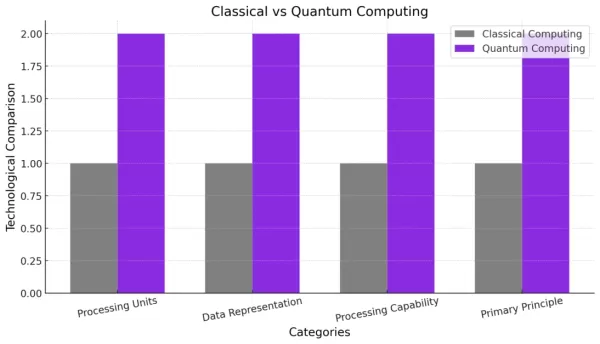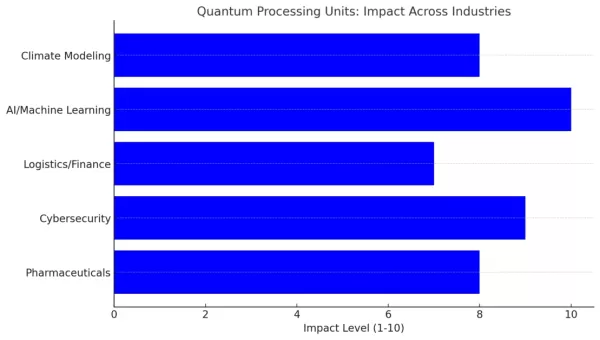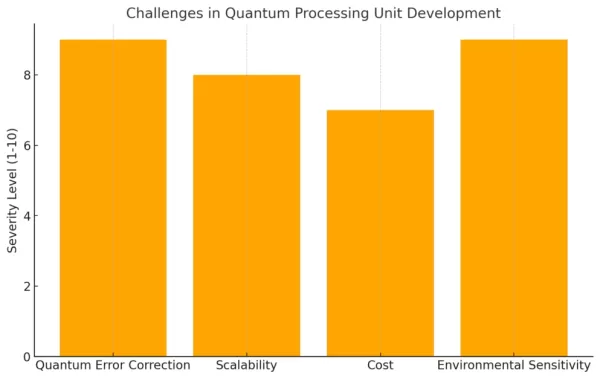QPUs: Revolutionizing Computing's Future
Quantum computing, which used to be just a theoretical concept, is now rapidly evolving into a groundbreaking technological frontier. At the center of this revolution are Quantum Processing Units (QPUs), the driving force behind quantum computers. Unlike traditional processors that depend on binary logic (bits that are either 0s or 1s), QPUs harness the unique aspects of quantum mechanics to process information in ways that classical computers simply can't. As quantum technology progresses, QPUs are poised to transform industries, tackle previously unsolvable challenges, and unlock new levels of computational power.
We'll now explore how QPUs function, their current development status, and the potential impact they'll have on various sectors.
What Are Quantum Processing Units?
At the heart of conventional computing lies the Central Processing Unit (CPU), which operates using binary bits that represent either a 0 or a 1. Quantum Processing Units (QPUs), on the other hand, utilize quantum bits (qubits), which can exist in multiple states at once thanks to two key quantum properties: superposition and entanglement.
- Superposition enables qubits to represent both 0 and 1 simultaneously, vastly increasing the amount of data that can be processed compared to classical bits.
- Entanglement connects qubits so that the state of one can instantly influence another, no matter the distance between them.
These properties allow QPUs to solve incredibly complex problems much faster than classical computers by simultaneously exploring multiple solutions.

The Current State of QPUs
Quantum computing is still in its early stages, yet significant strides have been made in recent years. Major companies like IBM, Google, Intel, and Rigetti have developed QPUs that can run specialized quantum algorithms. For instance, Google's Sycamore processor achieved "quantum supremacy" in 2019, performing a calculation in 200 seconds that would have taken a classical supercomputer 10,000 years.
These initial QPUs, classified as Noisy Intermediate-Scale Quantum (NISQ) devices, grapple with challenges such as quantum noise, high error rates, and limited qubit coherence times. Nevertheless, ongoing research is enhancing the stability and scalability of QPUs, paving the way for wider adoption.
The Future Impact of QPUs
As QPUs continue to advance, their influence across various industries will be revolutionary. Here's a look at some key areas where quantum computing will make a transformative impact:
1. Pharmaceuticals and Drug Discovery
Quantum computers will significantly speed up drug discovery by simulating molecular structures and interactions with unprecedented precision. Classical computers struggle to model complex molecules, but QPUs can analyze countless configurations at once, drastically reducing the time and cost needed to develop new medications.
2. Cryptography and Cybersecurity
Quantum computing poses both a challenge and an opportunity in the field of cybersecurity. Classical encryption methods, like RSA, depend on the difficulty of factoring large numbers—a task that QPUs could accomplish in minutes. This threat has spurred the development of quantum-resistant cryptography. Conversely, QPUs can be used to develop far more secure encryption methods based on quantum mechanics principles.
3. Optimization Problems
QPUs will revolutionize industries like logistics, manufacturing, and finance by tackling complex optimization problems—such as finding the most efficient delivery routes or managing large investment portfolios. QPUs can assess multiple variables simultaneously, making them far more efficient than classical computers at finding optimal solutions.
4. Artificial Intelligence and Machine Learning
Quantum computing will turbocharge AI and machine learning by dramatically increasing data processing speed. With QPUs, training AI models will be exponentially faster, leading to more accurate predictions and real-time decision-making. Quantum-enhanced machine learning might even pave the way for Artificial General Intelligence (AGI)—machines capable of understanding and learning any intellectual task that humans can perform.

5. Climate Modeling and Sustainability
QPUs will be crucial in climate modeling, allowing scientists to simulate complex systems like weather patterns, ocean currents, and carbon cycles with greater accuracy. This will lead to more precise climate predictions and help develop effective strategies for mitigating climate change.
Challenges Ahead for QPUs
Despite their enormous potential, QPUs face significant hurdles that need to be overcome before they can reach their full capabilities. Quantum systems are highly sensitive to environmental factors like temperature and electromagnetic interference, which can disrupt computations. This sensitivity highlights the need for developing robust quantum error correction methods to ensure reliable performance.
Another challenge is the infrastructure required to build and maintain quantum systems, which remains costly. However, cloud-based quantum computing services are emerging, providing broader access to quantum systems without the need for owning hardware.

Conclusion
Quantum Processing Units (QPUs) are set to redefine the future of computing, offering solutions to problems that were previously unsolvable by classical systems. As QPUs evolve, they will impact industries from pharmaceuticals to finance, from AI to climate science. While significant challenges remain, the potential of QPUs is vast, and they will undoubtedly shape the future of innovation and technology.
The era of quantum computing is just beginning, and with it comes the rise of QPUs as the engines driving the race toward AGI. It seems almost inevitable that AGI will emerge before 2029, as predicted by Ray Kurzweil in The Singularity is Near, marking a transformative moment where machine intelligence rivals human intelligence, reshaping industries, societies, and the very nature of progress itself.
For more insights on why achieving AGI is crucial, readers should explore my perspectives on how AGI will benefit humanity.
Related article
 Apple's Craig Federighi Admits AI-Powered Siri Had Serious Flaws in Early Stages
Apple Executives Explain Siri Upgrade Delay
During WWDC 2024, Apple originally promised significant Siri enhancements including personalized context awareness and app automation capabilities. However, the company recently confirmed delays in deliver
Apple's Craig Federighi Admits AI-Powered Siri Had Serious Flaws in Early Stages
Apple Executives Explain Siri Upgrade Delay
During WWDC 2024, Apple originally promised significant Siri enhancements including personalized context awareness and app automation capabilities. However, the company recently confirmed delays in deliver
 Master AI Inpainting Techniques: Midjourney Guide for Flawless Image Editing
Discover the transformative capabilities of Midjourney's AI inpainting technology, a revolutionary feature that empowers creators to refine and perfect AI-generated artwork with surgical precision. This definitive guide reveals expert techniques for
Master AI Inpainting Techniques: Midjourney Guide for Flawless Image Editing
Discover the transformative capabilities of Midjourney's AI inpainting technology, a revolutionary feature that empowers creators to refine and perfect AI-generated artwork with surgical precision. This definitive guide reveals expert techniques for
 Manus Debuts 'Wide Research' AI Tool with 100+ Agents for Web Scraping
Chinese AI innovator Manus, which previously gained attention for its pioneering multi-agent orchestration platform catering to both consumers and professional users, has unveiled a groundbreaking application of its technology that challenges convent
Comments (31)
0/200
Manus Debuts 'Wide Research' AI Tool with 100+ Agents for Web Scraping
Chinese AI innovator Manus, which previously gained attention for its pioneering multi-agent orchestration platform catering to both consumers and professional users, has unveiled a groundbreaking application of its technology that challenges convent
Comments (31)
0/200
![DonaldLee]() DonaldLee
DonaldLee
 August 9, 2025 at 11:00:59 AM EDT
August 9, 2025 at 11:00:59 AM EDT
Mind-blowing stuff! QPUs sound like they could change everything—imagine solving problems in seconds that would take supercomputers years. But, like, are we ready for the ethical mess this might bring? 🤯


 0
0
![MatthewScott]() MatthewScott
MatthewScott
 April 21, 2025 at 5:21:27 AM EDT
April 21, 2025 at 5:21:27 AM EDT
¡Los QPUs son impresionantes! Es como entrar al futuro de la computación. Estoy emocionado pero también un poco asustado por lo rápido que avanzan las cosas. ¡No puedo esperar a ver qué viene después! 🚀


 0
0
![FrankSanchez]() FrankSanchez
FrankSanchez
 April 21, 2025 at 1:28:40 AM EDT
April 21, 2025 at 1:28:40 AM EDT
QPUs are mind-blowing! It's like stepping into the future of computing. I'm excited but also a bit scared about how fast things are moving. Can't wait to see what they come up with next! 🚀


 0
0
![RogerGonzalez]() RogerGonzalez
RogerGonzalez
 April 20, 2025 at 3:14:05 AM EDT
April 20, 2025 at 3:14:05 AM EDT
¡Los QPUs son alucinantes! El futuro de la computación está aquí, y es emocionante ver cómo están cambiando todo. Pero, hombre, ¡es tan complejo! Necesito una explicación más sencilla para entenderlo de verdad. Aún así, es fascinante ver cómo se desarrolla esta revolución! 🚀


 0
0
![EdwardTaylor]() EdwardTaylor
EdwardTaylor
 April 19, 2025 at 4:59:17 PM EDT
April 19, 2025 at 4:59:17 PM EDT
QPUsは未来のコンピューティングの扉を開くものだね!進化のスピードが早すぎて少し怖いけど、次に何が出てくるのか楽しみだよ!🚀


 0
0
![AlbertRodriguez]() AlbertRodriguez
AlbertRodriguez
 April 19, 2025 at 4:46:43 PM EDT
April 19, 2025 at 4:46:43 PM EDT
QPUs são incríveis! O futuro da computação está aqui e é quântico! Ainda estou tentando entender como funcionam, mas o potencial é louco. Mal posso esperar para ver o que vem a seguir! 🚀


 0
0
Quantum computing, which used to be just a theoretical concept, is now rapidly evolving into a groundbreaking technological frontier. At the center of this revolution are Quantum Processing Units (QPUs), the driving force behind quantum computers. Unlike traditional processors that depend on binary logic (bits that are either 0s or 1s), QPUs harness the unique aspects of quantum mechanics to process information in ways that classical computers simply can't. As quantum technology progresses, QPUs are poised to transform industries, tackle previously unsolvable challenges, and unlock new levels of computational power.
We'll now explore how QPUs function, their current development status, and the potential impact they'll have on various sectors.
What Are Quantum Processing Units?
At the heart of conventional computing lies the Central Processing Unit (CPU), which operates using binary bits that represent either a 0 or a 1. Quantum Processing Units (QPUs), on the other hand, utilize quantum bits (qubits), which can exist in multiple states at once thanks to two key quantum properties: superposition and entanglement.
- Superposition enables qubits to represent both 0 and 1 simultaneously, vastly increasing the amount of data that can be processed compared to classical bits.
- Entanglement connects qubits so that the state of one can instantly influence another, no matter the distance between them.
These properties allow QPUs to solve incredibly complex problems much faster than classical computers by simultaneously exploring multiple solutions.

The Current State of QPUs
Quantum computing is still in its early stages, yet significant strides have been made in recent years. Major companies like IBM, Google, Intel, and Rigetti have developed QPUs that can run specialized quantum algorithms. For instance, Google's Sycamore processor achieved "quantum supremacy" in 2019, performing a calculation in 200 seconds that would have taken a classical supercomputer 10,000 years.
These initial QPUs, classified as Noisy Intermediate-Scale Quantum (NISQ) devices, grapple with challenges such as quantum noise, high error rates, and limited qubit coherence times. Nevertheless, ongoing research is enhancing the stability and scalability of QPUs, paving the way for wider adoption.
The Future Impact of QPUs
As QPUs continue to advance, their influence across various industries will be revolutionary. Here's a look at some key areas where quantum computing will make a transformative impact:
1. Pharmaceuticals and Drug Discovery
Quantum computers will significantly speed up drug discovery by simulating molecular structures and interactions with unprecedented precision. Classical computers struggle to model complex molecules, but QPUs can analyze countless configurations at once, drastically reducing the time and cost needed to develop new medications.
2. Cryptography and Cybersecurity
Quantum computing poses both a challenge and an opportunity in the field of cybersecurity. Classical encryption methods, like RSA, depend on the difficulty of factoring large numbers—a task that QPUs could accomplish in minutes. This threat has spurred the development of quantum-resistant cryptography. Conversely, QPUs can be used to develop far more secure encryption methods based on quantum mechanics principles.
3. Optimization Problems
QPUs will revolutionize industries like logistics, manufacturing, and finance by tackling complex optimization problems—such as finding the most efficient delivery routes or managing large investment portfolios. QPUs can assess multiple variables simultaneously, making them far more efficient than classical computers at finding optimal solutions.
4. Artificial Intelligence and Machine Learning
Quantum computing will turbocharge AI and machine learning by dramatically increasing data processing speed. With QPUs, training AI models will be exponentially faster, leading to more accurate predictions and real-time decision-making. Quantum-enhanced machine learning might even pave the way for Artificial General Intelligence (AGI)—machines capable of understanding and learning any intellectual task that humans can perform.

5. Climate Modeling and Sustainability
QPUs will be crucial in climate modeling, allowing scientists to simulate complex systems like weather patterns, ocean currents, and carbon cycles with greater accuracy. This will lead to more precise climate predictions and help develop effective strategies for mitigating climate change.
Challenges Ahead for QPUs
Despite their enormous potential, QPUs face significant hurdles that need to be overcome before they can reach their full capabilities. Quantum systems are highly sensitive to environmental factors like temperature and electromagnetic interference, which can disrupt computations. This sensitivity highlights the need for developing robust quantum error correction methods to ensure reliable performance.
Another challenge is the infrastructure required to build and maintain quantum systems, which remains costly. However, cloud-based quantum computing services are emerging, providing broader access to quantum systems without the need for owning hardware.

Conclusion
Quantum Processing Units (QPUs) are set to redefine the future of computing, offering solutions to problems that were previously unsolvable by classical systems. As QPUs evolve, they will impact industries from pharmaceuticals to finance, from AI to climate science. While significant challenges remain, the potential of QPUs is vast, and they will undoubtedly shape the future of innovation and technology.
The era of quantum computing is just beginning, and with it comes the rise of QPUs as the engines driving the race toward AGI. It seems almost inevitable that AGI will emerge before 2029, as predicted by Ray Kurzweil in The Singularity is Near, marking a transformative moment where machine intelligence rivals human intelligence, reshaping industries, societies, and the very nature of progress itself.
For more insights on why achieving AGI is crucial, readers should explore my perspectives on how AGI will benefit humanity.
 Apple's Craig Federighi Admits AI-Powered Siri Had Serious Flaws in Early Stages
Apple Executives Explain Siri Upgrade Delay
During WWDC 2024, Apple originally promised significant Siri enhancements including personalized context awareness and app automation capabilities. However, the company recently confirmed delays in deliver
Apple's Craig Federighi Admits AI-Powered Siri Had Serious Flaws in Early Stages
Apple Executives Explain Siri Upgrade Delay
During WWDC 2024, Apple originally promised significant Siri enhancements including personalized context awareness and app automation capabilities. However, the company recently confirmed delays in deliver
 Master AI Inpainting Techniques: Midjourney Guide for Flawless Image Editing
Discover the transformative capabilities of Midjourney's AI inpainting technology, a revolutionary feature that empowers creators to refine and perfect AI-generated artwork with surgical precision. This definitive guide reveals expert techniques for
Master AI Inpainting Techniques: Midjourney Guide for Flawless Image Editing
Discover the transformative capabilities of Midjourney's AI inpainting technology, a revolutionary feature that empowers creators to refine and perfect AI-generated artwork with surgical precision. This definitive guide reveals expert techniques for
 Manus Debuts 'Wide Research' AI Tool with 100+ Agents for Web Scraping
Chinese AI innovator Manus, which previously gained attention for its pioneering multi-agent orchestration platform catering to both consumers and professional users, has unveiled a groundbreaking application of its technology that challenges convent
Manus Debuts 'Wide Research' AI Tool with 100+ Agents for Web Scraping
Chinese AI innovator Manus, which previously gained attention for its pioneering multi-agent orchestration platform catering to both consumers and professional users, has unveiled a groundbreaking application of its technology that challenges convent
 August 9, 2025 at 11:00:59 AM EDT
August 9, 2025 at 11:00:59 AM EDT
Mind-blowing stuff! QPUs sound like they could change everything—imagine solving problems in seconds that would take supercomputers years. But, like, are we ready for the ethical mess this might bring? 🤯


 0
0
 April 21, 2025 at 5:21:27 AM EDT
April 21, 2025 at 5:21:27 AM EDT
¡Los QPUs son impresionantes! Es como entrar al futuro de la computación. Estoy emocionado pero también un poco asustado por lo rápido que avanzan las cosas. ¡No puedo esperar a ver qué viene después! 🚀


 0
0
 April 21, 2025 at 1:28:40 AM EDT
April 21, 2025 at 1:28:40 AM EDT
QPUs are mind-blowing! It's like stepping into the future of computing. I'm excited but also a bit scared about how fast things are moving. Can't wait to see what they come up with next! 🚀


 0
0
 April 20, 2025 at 3:14:05 AM EDT
April 20, 2025 at 3:14:05 AM EDT
¡Los QPUs son alucinantes! El futuro de la computación está aquí, y es emocionante ver cómo están cambiando todo. Pero, hombre, ¡es tan complejo! Necesito una explicación más sencilla para entenderlo de verdad. Aún así, es fascinante ver cómo se desarrolla esta revolución! 🚀


 0
0
 April 19, 2025 at 4:59:17 PM EDT
April 19, 2025 at 4:59:17 PM EDT
QPUsは未来のコンピューティングの扉を開くものだね!進化のスピードが早すぎて少し怖いけど、次に何が出てくるのか楽しみだよ!🚀


 0
0
 April 19, 2025 at 4:46:43 PM EDT
April 19, 2025 at 4:46:43 PM EDT
QPUs são incríveis! O futuro da computação está aqui e é quântico! Ainda estou tentando entender como funcionam, mas o potencial é louco. Mal posso esperar para ver o que vem a seguir! 🚀


 0
0





























